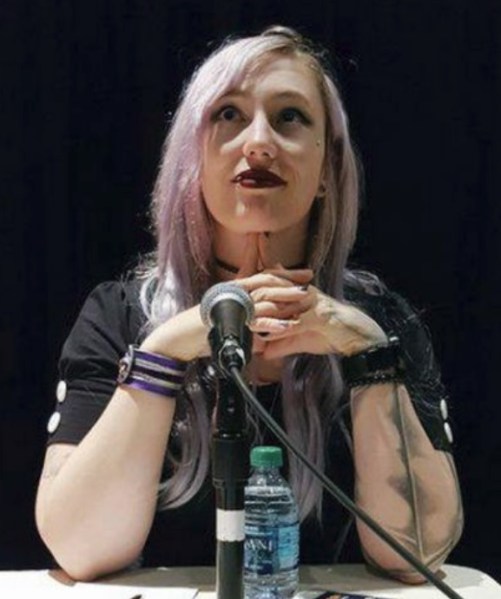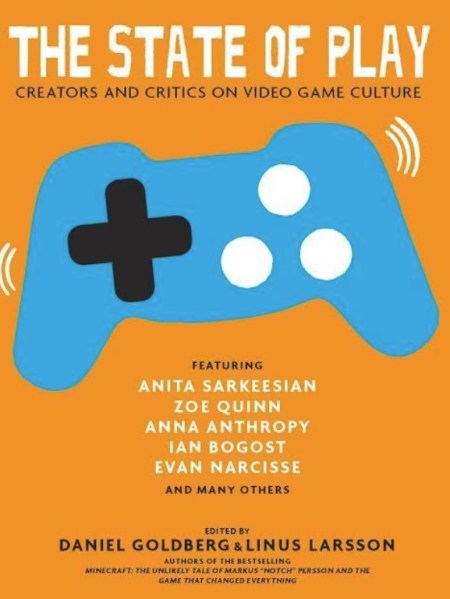As we noted in part one of our interview, Zoe Quinn endured an appalling amount of Internet hatred related to the Gamergate controversy. In response, she wrote a book Crash Override, chronicling how Gamergate almost destroyed her life.
In response, she has created the Crash Override Network, an advocacy group that helps people who are experiencing online abuse.
Quinn faced two years of personal attacks, doxxing, and a continuous spotlight. She was accused of sleeping with journalists and others for professional advancement, including getting positive reviews for her game Depression Quest, or at least tapping her friends to get positive press. Those claims were spurious at best, but they spread across the Internet and created a movement that was stoked by the likes of former Breitbart writer Milo Yiannopoulos.
Now she’s working on a new game that she says will be a comedy. How’s that for resilience? I found Quinn’s description of Internet hate from within the eye of the storm to be clear-eyed and gripping, as I experienced a small version of that myself with my own Cuphead controversy. There were times in the height of Gamergate when Quinn felt overwhelmed that false information was going to rule the day. And that was in the days before “fake news” was a household phrase.
I have corresponded with Gamergate fans, and I have heard what they have to say about Quinn. In this particular forum, I am giving Quinn the floor in a wide-ranging conversation about what happened and how she has responded.
Here’s an edited transcript of part two our interview, which is about how she is moving on and turning her experience into something positive. Here’s the link to part one.

Above: Zoe Quinn’s book Crash Override chronicles her Gamergate experience and how she is fighting back.
GamesBeat: Your Crash Override Network seems like such a hard thing to do. It’s almost like boiling the ocean, to try to resist this force [of Internet hatred].
Quinn: The way forward—I’ve been trying to think about this stuff for a very long time, how to make life better for the most people. A big part of the equation is also doing it without burning myself out super hard, or having it being the only thing I get to do with my life anymore. I’m so ill-suited for this position. I’m a weird goofy dork. I have a hard time being serious for more than five seconds, but this is such a serious thing. People look to me for guidance or responsibility. People put a lot of stuff on me as a symbol of something, which is nothing I opted into, but it’s a responsibility I take seriously regardless. That all adds to the Godzilla effect.
I think that my way forward might be to try to create as much stuff possible to teach other people how to be there for each other and push to get other people how to do all the things I know how to do – buffer your privacy, secure your accounts, just walk through someone who’s dealing with one of these crises. If everyone has the tool kit and knows how to do that, maybe I don’t have to be in this position. I can go back to working on games, because I really love doing that.
GamesBeat: Have you had your chance to really sink your teeth into game development?
Quinn: I had a very successful Kickstarter about a year ago, and I’m finally back to doing the thing I love. It was kind of paused because of the book tour. I don’t know why I got myself into this, but I thought, “Oh, it’s writing a book. That’s so much easier than writing and developing and programming and doing an art for all of this game stuff. Writing a book is only one option. I don’t have to think of 20 different things for the player to do and then have the game account for each one of those things.” It seemed like an easier way of writing, and I was totally wrong about that.
I’ve been in this situation where I was going super hard on finishing the book and getting it out — and now doing all the promotional stuff, because I didn’t realize that after you finish a book there’s still a kajillion things to do – while trying to finish this game. But working on the game has been such a profoundly healing experience for me. It’s something I didn’t ever think I would be able to do again.
I tried, during Gamergate. I’d sit down to work on stuff and my mind would go blank and I just couldn’t deal with it. I didn’t know I had [post-traumatic stress disorder] PTSD. But I feel like I can’t help but be a game developer. I’m one of those weird indies where I can do everything from coding to art to music to whatever. I can do everything. If I wanted to, I could go to any number of different media and not work in games anymore fairly easily. I have enough of a skill set.
But I was just daydreaming one day about this weird technical problem I hadn’t solved forever ago. “Oh, what if I do this approach to it.” I just sat down to see if this would theoretically work, and it works. “Oh, now what if I do this?” All of that magic started slowly coming back to me. I remember, after I think eight hours passing where I’d gone into this coding frenzy—I wanted to make an FMV game, like Night Trap style, a comedy game in that vein. For so long that was my dream game. I figured out how to do it in a way that would let me do a lot of weird stuff with that format, over the course of this afternoon. I was just sitting at my desk crying with relief. I was so happy that I didn’t lose it, because I was so convinced that I had.
Now that I’m working on this game, a comedy game about loving yourself and other people, doing comedy where no one’s the butt of the joke—it’s absurdist. It’s goofy and good-natured. It’s silly and sweet. A lot of what the player has to do in the game is being good to people and being good to themselves. It’s been finding a lost piece of myself again.
To go from writing this book, which I wasn’t sure I wanted to do—I kind of feel like I’m in a position where I went through this wild thing, and I can use this as a lens to talk about bigger issues. Maybe make it so this doesn’t happen as severely or to as many people. Or if and when it does, people are maybe prepared a bit better to step up and be helpful, or be warned away from participating in what feels like innocuous behavior.
I don’t want to be the Gamergate person forever, especially since for everyone else Gamergate was one thing, but for me it started with someone who’d been profoundly abusive to me, someone who I had trusted. It has a personal level to it that I don’t think it would for anyone else.

Above: Zoe Quinn in earlier days.
GamesBeat: It seems like the book is a way to put some of these things to rest? I feel like the internet doesn’t have any rules against double jeopardy. You’re put on trial for the same thing over and over. The book seems like a way to deal with that.
Quinn: That’s a big part of it. I’m trying to use it as a way to bring in other people who aren’t in the position I’m in, who never got to talk about what they went through. You’ve read it, so you know there are a bunch of sections where I just posted statements from people who’ve been through the wringer and dealt with stuff like that. I try to bring them with me as much as I can. I had to fight for that, too, because people would ask, “Can you rephrase this? Can you put these interviews in your own words?” That’s kind of missing the point of what I’m trying to do here. My publisher was cool about it and I’m grateful for that.
I feel like I’m always going to be stuck having to talk about this a lot, but at least I can point to the book. If I can make as many tools and educational materials for people—not stuff about Gamergate, because I really am over it in terms of relitigating every single thing that happened. At this point I’ve forgotten so much of the ridiculous stuff that got involved, celebrities weighing in, all this crap. But the point is, if I can make a bunch of educational stuff and put that out there and get people to do what I’ve been doing for other people when they come to me for help on a bigger scale, maybe I won’t have to keep talking about it and I can just be a game developer again.
GamesBeat: I saw one of these guys posting just recently, “Zoe never filed an FBI report,” and all I could think was, “Why are you still bringing this up now?” It seems like one of the flaws in the internet itself. There’s nothing to remind people that we’ve already gone through this.
Quinn: Yeah. A, that’s not true, because—there is so much paperwork. Not just the FBI thing. I think people, too—when they got the Freedom of Information requests for the Gamergate documents, they assumed that I wasn’t in it, but I think they didn’t realize that my case was different because it was a domestic violence case, a totally separate thing. Unlike a lot of the other targets, I know who did this to me, and the motivations and stuff—it’s not so much a criminal harassment issue as a domestic violence and abuse issue. Not only is that stored in different places, but there are different laws surrounding privacy in those matters, for obvious reasons.
But it’s another one of these things–I can go out and say that, but then it’s a whole thing. People try to prove me wrong. It’ll dredge up a bunch of other stuff. The guy who did all this to me is still hyper-fixated and pops up from time to time to stir the pot. It’s not a thing I want to deal with when, instead of doing that, I can go work on things that I love. At some point you have to call it and decide for yourself where your boundary is.
The thing that’s been hard to do, that I’ve been trying to do, is be trustful. Just hoping, or believing, in people’s better natures. I still strongly feel that a lot of people who participated in Gamergate, who participated in this sort of thing, are doing so because they go into it with—they’ll believe the version of events that fits their world view. Then you have people who will hopefully be rational and look at something and realize, “Oh, that’s clearly BS on its face.” If you look for any actual proof it’s not there. The thing that I keep trying to remind myself of is that those people are not anywhere near as loud. Why would they be? They have no reason to be.
I feel like if I’m patient—I have to allow myself to be patient and wait for other people to figure it out. I mitigate harm where I can. I don’t run myself ragged trying—it would be so easy to get caught up in living a life that’s purely reactive and responsive to what other people are doing. But you get your agency back. You get to do stuff because you love it.
GamesBeat: I saw that some Gamergaters tried to infiltrate Crash Override. They were counter-claiming that the group was compiling dossiers to fire back at them in some way?
Quinn: It’s like there’s some weird conspiracy theory—there are a couple of different conspiracy theories claiming that I killed people. All right, who were they? Who did I kill? If you even look for any specific details—you would think that if someone is so convinced that this thing happened, they should know basics like that. Who was the victim? When did this happen? Where did this happen? Instead of just yelling the clickbait headline version of events.
With Crash it’s tricky, because the hotline has been down for some time, because I’ve been trying to work with people who do stuff like build the National Suicide Lifeline. People who work in this space as the thing they do. I’m still just a game developer. They have wisdom and insight into this whole thing that I don’t, as far as how to run things. All we did was, people would come to us for help and we’d say, “Here’s what we can do. Let’s get your accounts secured. Let’s get information we can scrubbed off. If you don’t want to give us any information, we’ll walk you through the process.”
Those people aren’t going to go out and say, “Hey, this is what happened, this is what the process looked like.” If they come to us they’re already hiding from an online mob. The last thing anybody wants to do is then say, “Hey, internet mob, I was working with someone else you hated and now I’m going to say something nice about them.” They don’t want to attract that again. The only people left to talk about it are people making stuff up and trying to pass stuff off that’s not related or not even me as something having to do with the Network.
I’m just trying to pass off everything I know to people who live and breathe hotlines. I’ve been working on a resource toolkit of stuff that other groups, domestic violence advocates and stuff like that—giving them the tools so that if someone comes in and their ex is stalking them, that might have an online component. Here’s everything I know about—everything is purely defensive. Here’s how to help people that come to you, secure their personal information, stuff like that. It’s to find a point of intersection, because so frequently online abuse comes from offline abuse. Trying to empower the people doing work in those spaces with the technobabble infosec hell that they might not be well-equipped to navigate. And then open-sourcing all the information I have.
I’ve only ever been interested in self-defense measures, not going after individual people participating in these sorts of behavior, outside of filing reports if that’s what the victim wants.

Above: Some of Zoe Quinn’s writings
GamesBeat: That’s law enforcement’s job?
Quinn: Right. I’m skeptical of law enforcement’s ability to do much to help this stuff. I worry that overinvolvement of police leads to bad stuff happening to a lot of folks. I’m more interested in seeing consumer advocacy for more privacy measures, where government and law enforcement can crack down on companies that are taking advantage of online abuse, or encouraging it, or participating in it, rather than just dealing with individual bad actors.
How do we focus on harm reduction? How do we make it so that this stuff can’t turn into a mob in the way that it does? And if it does, how do we keep it from escalating to dangerous places? I’m more interested in the mechanisms rather than the individual actors.

